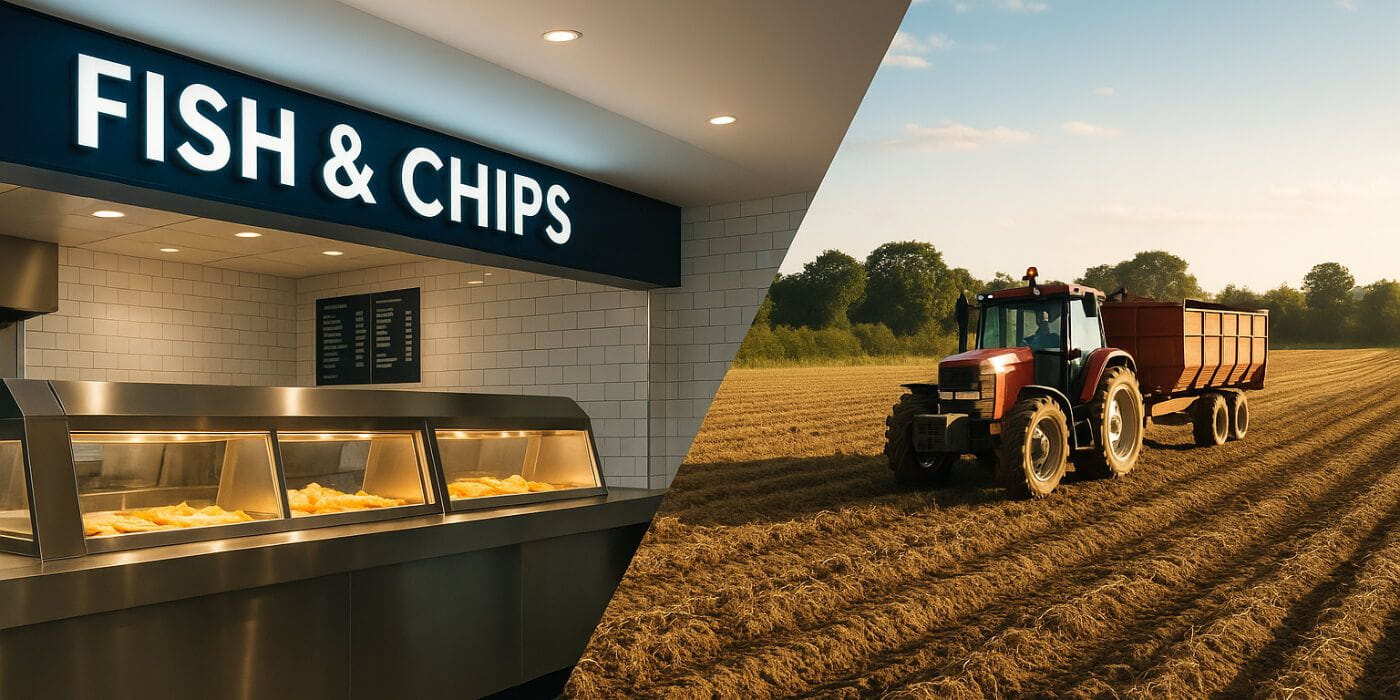From Farm to Fryer: What Every Chippy Should Know
Posted by Abby Barker on 11th May 2025 Reading Time:
Welcome to this edition of Trade Talks, where we bring you insights straight from the friers of the Fish & Chip industry. In this column, Abby Barker, Frier at Millers Fish & Chips in Haxby, shares her perspective on the trade.
You don’t usually find someone like me behind a fryer. I’m 21, a woman, and I’ve spent most of my life on a farm. Now, I spend my days frying chips at Millers Fish & Chips in Haxby. They might seem like two totally different worlds on paper — but the longer I’m in this job, the more I realise they’re deeply connected.
And right now, farmers need the support of people in our industry more than ever.

Standing Between Two Worlds
I’m lucky — or maybe just uniquely placed — to see both sides. At work, I handle potatoes every day. I know what a good chip should look, taste, and feel like. But I also know what it takes to get those potatoes into our shop — the machinery, the labour, the fertiliser, the unpredictable weather, and the cost.
It’s easy to take an ingredient for granted when it arrives neatly packed and ready to prep. But when you’ve watched your family lose money on a crop because fields were too wet to lift or seen fertiliser prices triple, it changes how you view that bag of spuds.
The Cost No One Sees
Let’s talk honestly for a second. Growing just one acre of potatoes can cost upwards of £2,500–£3,000 a year. And that’s before any profit is made. Land rental alone can be £750 per hectare — money spent before planting the first seed.
Then there are the input costs: fertilisers, crop protection, fuel, storage, and machinery that constantly need repairs or replacements. Add to that labour, which is harder to come by and more expensive to retain.
And just when you think you’ve done everything right, the rain comes — or doesn’t. The last three seasons have been a nightmare for lifting. Wet weather has delayed harvests, causing not just yield losses but quality issues, too. Potatoes left in the ground for too long break down, rot or are stored poorly, meaning farmers are paid less or not at all.

So when someone complains about the cost of chips going up, I wish they could see what I’ve seen.
Bridging the Gap
Most chippies wouldn’t claim to know what farmers go through. And why would they? I truly believe that if we had more understanding of where our food comes from — the real cost of producing it — we’d treat it and those who grow it more respectfully.
That might look like buying British wherever you can—or asking your supplier about the origin of your potatoes. Or even just educating your team — reminding them that those chips started in the soil, under the care of someone who took a financial risk to grow them.
British farming is under pressure like never before. Chemical costs have risen. Labour is short. Weather is becoming harder to predict. And if growers can’t make it work, they’ll walk away — and we’ll all feel that down the line.

It’s All Connected
I know not everyone has the background I do — but that’s why I wanted to write this. I’ve seen both ends of the food chain. I’ve been up at 5 am to feed livestock and standing at the fryer during a Friday night rush. And what connects them is this: every chip we serve started as a seed in soil someone looked after.
That’s why I care about the details. I want the chips I fry to be cooked perfectly, not just because it’s my job, but because I know the effort it took to grow them. I want chippy owners and friers to see that effort, too — because when we understand the whole story, we make better choices.

What We Can Do
So what can we do as an industry?
- Support British — Ask where your ingredients come from. Prioritise traceable, Red Tractor-certified products when possible.
- Educate staff and customers — Talk about the journey of food. It’s not just romantic — it builds value.
- Respect the product — Don’t waste it. Treat every ingredient with the care it deserves.
- Champion farming stories — Share the realities. Let people know the effort behind every plate of food.
Food connects us all — and we all have a role in protecting the people who grow it.
Did you enjoy this Trade Talks column? Have industry insights or thoughts to share? We’d love to hear from you! Drop us a line at info@worldofceres.com.

